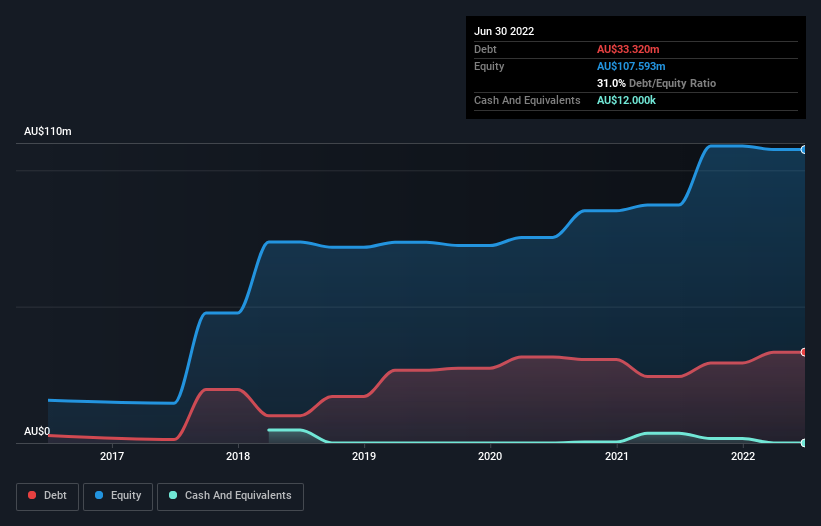
Warren Buffett famously said, 'Volatility is far from synonymous with risk.' It's only natural to consider a company's balance sheet when you examine how risky it is, since debt is often involved when a business collapses. We note that Duxton Farms Limited (ASX:DBF) does have debt on its balance sheet. But should shareholders be worried about its use of debt?
When Is Debt A Problem?
Debt assists a business until the business has trouble paying it off, either with new capital or with free cash flow. Ultimately, if the company can't fulfill its legal obligations to repay debt, shareholders could walk away with nothing. While that is not too common, we often do see indebted companies permanently diluting shareholders because lenders force them to raise capital at a distressed price. By replacing dilution, though, debt can be an extremely good tool for businesses that need capital to invest in growth at high rates of return. The first step when considering a company's debt levels is to consider its cash and debt together.
Our analysis indicates that DBF is potentially overvalued!
How Much Debt Does Duxton Farms Carry?
You can click the graphic below for the historical numbers, but it shows that as of June 2022 Duxton Farms had AU$33.3m of debt, an increase on AU$24.4m, over one year. And it doesn't have much cash, so its net debt is about the same.

How Strong Is Duxton Farms' Balance Sheet?
According to the last reported balance sheet, Duxton Farms had liabilities of AU$9.61m due within 12 months, and liabilities of AU$43.2m due beyond 12 months. Offsetting this, it had AU$12.0k in cash and AU$470.0k in receivables that were due within 12 months. So its liabilities outweigh the sum of its cash and (near-term) receivables by AU$52.4m.
This is a mountain of leverage relative to its market capitalization of AU$56.3m. Should its lenders demand that it shore up the balance sheet, shareholders would likely face severe dilution. There's no doubt that we learn most about debt from the balance sheet. But you can't view debt in total isolation; since Duxton Farms will need earnings to service that debt. So if you're keen to discover more about its earnings, it might be worth checking out this graph of its long term earnings trend.
Over 12 months, Duxton Farms made a loss at the EBIT level, and saw its revenue drop to AU$17m, which is a fall of 6.7%. We would much prefer see growth.
Caveat Emptor
Importantly, Duxton Farms had an earnings before interest and tax (EBIT) loss over the last year. Indeed, it lost AU$4.9m at the EBIT level. Considering that alongside the liabilities mentioned above does not give us much confidence that company should be using so much debt. So we think its balance sheet is a little strained, though not beyond repair. Another cause for caution is that is bled AU$8.8m in negative free cash flow over the last twelve months. So in short it's a really risky stock. The balance sheet is clearly the area to focus on when you are analysing debt. But ultimately, every company can contain risks that exist outside of the balance sheet. For instance, we've identified 2 warning signs for Duxton Farms (1 can't be ignored) you should be aware of.
If you're interested in investing in businesses that can grow profits without the burden of debt, then check out this free list of growing businesses that have net cash on the balance sheet.
If you're looking to trade Duxton Farms, open an account with the lowest-cost platform trusted by professionals, Interactive Brokers.
With clients in over 200 countries and territories, and access to 160 markets, IBKR lets you trade stocks, options, futures, forex, bonds and funds from a single integrated account.
Enjoy no hidden fees, no account minimums, and FX conversion rates as low as 0.03%, far better than what most brokers offer.
Sponsored ContentNew: Manage All Your Stock Portfolios in One Place
We've created the ultimate portfolio companion for stock investors, and it's free.
• Connect an unlimited number of Portfolios and see your total in one currency
• Be alerted to new Warning Signs or Risks via email or mobile
• Track the Fair Value of your stocks
Have feedback on this article? Concerned about the content? Get in touch with us directly. Alternatively, email editorial-team (at) simplywallst.com.
This article by Simply Wall St is general in nature. We provide commentary based on historical data and analyst forecasts only using an unbiased methodology and our articles are not intended to be financial advice. It does not constitute a recommendation to buy or sell any stock, and does not take account of your objectives, or your financial situation. We aim to bring you long-term focused analysis driven by fundamental data. Note that our analysis may not factor in the latest price-sensitive company announcements or qualitative material. Simply Wall St has no position in any stocks mentioned.
About ASX:DBF
Duxton Farms
Primarily engages in the sowing and harvesting of dryland and irrigated crops in Australia.
Adequate balance sheet low.
Market Insights
Community Narratives



